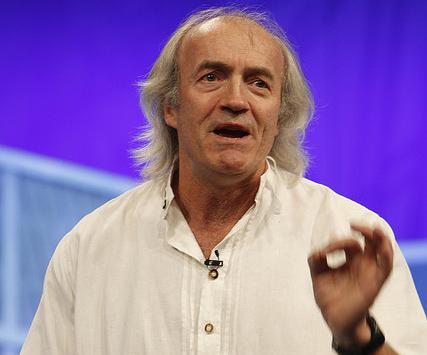Microsoft’s Bill Buxton on risk and innovation
Microsoft’s Bill Buxton at MIX09. (Photo by Flickr user D.Begley)
Story from The Takeaway. Listen to audio for full report.
For decades, Microsoft Research’s Bill Buxton has been tracking innovation through history — online, Buxton maintains an archive of interactive devices, tracking how technology evolves. He’s a firm believer that the seeds of our most innovative ideas and products have been around for years, just waiting for the perfect storm of conditions that can turn a good idea into something more potent.
Creativity isn’t divine inspiration. It’s a skill. And something Buxton knows a thing or two about. “Innovation, creativity, and managing risk — it’s like running, or music, or anything else it’s something you’ve got to practice,” he says. “If you don’t use it you lose it.”
Politicians including President Obama are trying to figure out how to encourage the United States to be more innovative. To achieve that, Buxton believes “we have to learn how to manage risk much better.” The United States tends to be a risk-averse society, according to Buxton, but he points out that “there’s not a single institution… that we respect in our society today that isn’t the result of people taking on incredible risk.”
One myth that people have to dispel is that ideas are precious, Buxton asserts. “Ideas are a dime a dozen. The way you have a great idea is to have 100 good ones.”
The key question is what people do with the ideas after they’ve had them. “It’s not just the creativity you bring to having ideas in the first place,” Buxton says, “it’s the creativity and process you bring to evaluating, and the insights from the outside, the things you would consider that no one else would consider.”
To get there, people should relax and have fun. “I was the kid in the back of the class that was always cracking jokes and messing things up,” Buxton says. “And I still do that.”
That playful fun is an important part of the creative process. “Most people when they’re building things, latch onto the first idea, and then go for it, because they feel as though they’re under the gun,” he points out. “When in fact, they should spend way more time thinking about what they’re going to do and planning.”
Buxton’s advice to companies is to spend more time honing ideas, rather than simply executing the first idea that comes up. “You can afford, if you have the right process, to explore way more ideas than people normally do,” he says. “The trap that companies get into is they have a success, and then they latch on to that.”
People and companies have to relax and let the ideas come. They have to recognize “that what got you to where you are today isn’t what’s going to get you to where you need to go tomorrow,” he says. “Making that change is the big challenge.”
————————————————
“The Takeaway” is a national morning news program, delivering the news and analysis you need to catch up, start your day, and prepare for what’s ahead. The show is a co-production of WNYC and PRI, in editorial collaboration with the BBC, The New York Times Radio, and WGBH.
